John T. Underwood
1854-1925
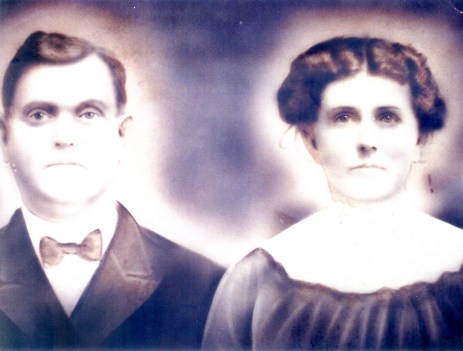
John T. & Ira Emma Underwood
Biographical Sketch On The Life Of John T. Underwood
The strength of North Alabama churches around the turn of the 20th Century is due greatly to the works of T. B. Larimore through Mars Hill College. In the sixteen years of its running, 1871-1887, there was an unleashing of evangelism that swept the Tennessee Valley area and beyond. One of T.B. Larimore's "boys," as the students were called, is the subject of this sketch.
John T. Underwood entered Mars Hill in 1878 and attended through the 1879-80 school session. These two years of study set him on a course that helped to make churches in Franklin and Colbert Counties, Alabama some of the strongest, and long lasting churches of Christ in that part of the country. According to the brief sketch in Larimore and His Boys, page 163, Brother Underwood worked at Barton, in Colbert County, Alabama. He planted churches around this area for many years. Most of the churches in Franklin And Colbert Counties were small country churches. Even to this day many of those churches still exist. One of these churches, the Spruce Pine Church of Christ, lower Franklin County, holds the cemetery where John T. Underwood and his wife Ira Emma are buried.
His stone bears the inscription that most described his life, "Minister Of The Gospel Of Christ." Many people now in the eternal presence of God, owe much to the teaching of this great old soldier of the cross. Though he died at the end of the first quarter of the 20th century, only eternity itself will bear proof of the good he has done, and still does for the name of Christ. "He being dead, yet speaks."
![]()
One By One They Leave Us
Mid-January last, while in Florida, word reached me that our beloved Brother John T. Underwood, of Spruce Pine, Alabama, had quietly laid his burdens down and gone home to rewards eternal. Doubtless a more fitting appraisal of his life shall be written by others. I have been very closely associated with him for many years, and would here record some outstanding facts of his life and labors. During the summer of 1891, while he was in a meeting near my childhood home in Mississippi, I was instructed in the way of the Lord, and he baptized me. He has been a great inspiration to me through all these intervening years. Let some record of him be preserved.
He was the son of William and Nancy Gresham Underwood; born in Tishomingo county, Mississippi, March 16, 1854. There, of a family of fourteen children, he grew up on a farm with almost no public schooling. He learned the gospel through the preaching of Brother John Taylor, and entered the famous Larimore school at Mars Hill, Alabama, when he was twenty-three. In that institution he remained through three successive terms, working his way. He was a vocal music teacher of no inconsiderable ability, but was inspired to preach the gospel and give his life thereto by his great friends, and mentor, T.B. Larimore.
While still a young man he was married to Miss Arrie Gresham, of Bell Green, Alabama, who has been his faithful wife through all these years. She bore him eight children, and she and they survive him and seek to carry on the work of the Lord. At first Brother Underwood confined his labors in the gospel to the country around Florence, Alabama. But it was not long till this finely-mannered, upstanding and winsome young man made himself so felt with the gospel that he was called to neighboring sections, and finally to many other states, both for meetings and debates. And for more than forty years he has gallantly kept up the fight, faithfully living and preaching the unmixed word of the Lord. Always dignified and kindly in manner; yet his unswerving devotion to the gospel often brought him into violent opposition with sectarians, which he accepted in good will and continued unflinchingly to expose all error and exalt the way of the Lord.
The most of his life had been lived in northern Alabama, but through all the labor-filled years working in several Southern states he commanded the respect and confidence of everybody; there has never been a breath or whisper against him; by no unholy living did he bring reproach upon the church of the Lord. Men from every walk of life who knew him spoke well of him. His was a life of sacrifice, willingly made for the truth. He told me he preferred to preach in out-of-the-way neglected places. He established many congregations and was signally successful in leading people to obey the gospel.
While in a meeting four years ago, he was stricken with paralysis. With becoming fortitude he accepted enforced confinement at at home. Yet he often spoke of his great desire once more to be in the field preaching. Finally the tired, worn-out frame gave way, and do we not know he is now safe in the arms of his Lord? How far his influence has gone, the ultimate of his service for good, will be revealed only in eternity. Rest sweetly, dear man; the fight will soon be over for us all.
-Price Billingsley, Firm Foundation, 1925, Vol. 42, No. 14, April 7th issue, page 4.
![]()
Another Good Man Has Gone From Us
On January 21, 1925, at his home in Franklin County, near Russellville, Ala., our brother, John T. Underwood, passed, by death, into the eternal state of the kingdom. The body of our friend and brother was buried at Spruce Pine, Ala. Funeral services were conducted by Brethren Jones, of Russellville; J. H. Horton, of Tuscumbia; and J. F. Chambers, of Florence.
Brother Underwood was about seventy-three years old, and had been a preacher of the ancient gospel about forty-five years. He was a humble, good man, who was entirely satisfied with what he could read in the Bible. He preached the conditions of salvation from past sins which are found in the commission of the Lord and that were preached by his chosen apostles. He was also satisfied with the simple worship which the apostles approved in the days of inspiration,
Brother Underwood was a student of Mars' Hill Academy, as I remember, in 1880, his last year there being my first year. While Mars' Hill was not established with any view of opposing innovations upon the worship of God, such as instrumental music and human organizations for the spread of the gospel—for these things were not discussed at that time, as they had spread but little—yet I believe that fewer pupils of that school have gone into these unscriptural things than any other school I know. Brother Larimore had a way of impressing upon young men the importance of the Bible, and the Bible alone, which had a wonderful influence in holding them to the truth. There was never any question about the ownership or control of this school. It was owned by Brother Larimore and controlled by the principles of New Testament teaching. Christian men and women taught in it, and it was, in a very important sense, a Christian school; but it was not owned by the churches, nor was it thrust upon them for their support: When Brother Larimore saw proper to quit teaching the school at Mars' Hill, it closed to be, and, therefore, could never depart from the truth and become a menace to New Testament teaching. After Brother Underwood left Mars' Hill, he settled at Marietta, Miss., and supplemented his support from the churches by the labor of his hands. He never had a business or an occupation that prevented him from contending earnestly for the faith. While he lived at Marietta, I was caned there to defend the teaching of the New Testament on the subject, action, and design of baptism, ill a public discussion. It was through his influence and effort that this discussion was arranged and carried through. The bold stand he made against what he believed to be error may have injured his business with some of his influential neighbors, but he loved what he believed to be the truth better than he did his business. From Marietta he moved back to Alabama and settled on a good farm in what we used to call" Russellville Valley," where he made his home till his death.
Though Brother Underwood was a preacher of no mean ability, he was never a care upon the churches, as he labored with his hands for his support and for the supported others who were dependent upon him. Like the apostle Paul in his memorable speech to the elders of the church at Ephesus, he could have said: "Yea, ye yourselves know, that these hands have ministered unto my necessities, and to them that were with me. I have showed you all things, how that so laboring ye ought to support the weak, and to remember the words of the Lord Jesus, how he said, It is more blessed to give than to receive." (Acts 20:34,35.) No doubt he received financial help from churches and individual Christians; but most of those who loved the apostolic way in North Mississippi and North Alabama were poor in this world's goods, and he, therefore, chose not to be a burden on them. I believe that men can consistently receive a support for themselves and families while they do nothing but preach the word, yet it would have been impossible to have permanently planted the truth in the field where he labored had it not been for men like him who could preach often at their own charges. It will be an evil day for the truth when all such men are crowded out by a lot of young men who may make preaching a profession and godliness a way of gain.
As I understand the matter, Brother Underwood spent the last few years of his life as an invalid, with little opportunity to teach people how to live, but with a good chance to teach them how to suffer affliction and how to die. "For our light affliction, which is but for a moment, worketh for us a far more exceeding and eternal weight of glory; while we look not at the things which are seen, but at the things which are not seen: for the things which are seen are temporal; but the things which are not seen are eternal." (2 Cor. 4:17,18.) A few moments in the glory world will pay for all the suffering which our brother endured. He had an opportunity to show his neighbors, his family, and his brethren how to submit to the will of God even in death and die like a man of faith, like a righteous man. "Let me die the death of the righteous, and let my last end be like his!" (Num. 23:10.)
Brother Underwood has gone to join the great number of Mars' Hill pupils who have preceded him to the glory world. Our teacher and faithful brother and a few of his pupils remain on this side, but I was surprised when I could count more who have passed over the river than I could of those who yet remain. This fact has greatly impressed me with the brevity of human life and with the importance of being prepared for the summons which must shortly come to us all.
John T. Underwood was a good, faithful man, and his place will not be easily filled. His family will miss him more than all of us; and may the Lord deal gently with them, and may they be prepared to meet him in that city where afflictions and death can never come.
-F. D. Srygley, Gospel Advocate, April 2, 1925, pp.323-324
![]()

John T. Underwood And His Horse
![]()
Location Of The Grave Of J. T. Underwood
From Birmingham, Alabama - From I-20 take the Arkadelphia Exit, Hwy. 78 toward Memphis. About 45 miles N.W. of Birmingham, in the city of Jasper, Alabama turn north on Hwy 5. Travel 26 miles to Natural Bridge. Cross Hwy 278 at Natural Bridge heading toward Haleyville. When crossing 278, Hwy 5 is joined by Hwy. 13. Ten miles north of Haleyville you will go through Phil Campbell. Just north of Phil Campbell the two lane road will go into a four-lane road. Just as you see that four-lane road you are at mile marker 285. Turn to the first right. (A "Spruce Pine Church of Christ" sign should be at the corner) Note: If you have driven any distance on the four-lane you have gone too far. Turn right off Hwy 13 and go 6/10th miles and turn right across the railroad tracks into the cemetery. Follow the little dirt road around to the the left where you see the church building straight ahead. Look to your left for a tall obelisk. The graves just in front of the obelisk are that of J. T. Underwood and his wife Ira Emma.
From Athens, Alabama - From I-65 in Athens, Alabama take Hwy. 72 west. Go through Florence. In Florence Hwy 72 will be joined by Hwy. 43, and will turn south briefly, crossing the Tennessee River into Sheffield. Follow Hwy. 72/43 through Muscle Shoals. At Tuscumbia Hwy. 72 will turn right toward Corinth. Do not turn right on Hwy. 72 Stay on Hwy 43 south. Go south through Littleville, then through Russellville. About seven or eight miles south of Russellville, you will ascend out of the Tennessee Valley. At the top of this hill, Hwy. 43 will turn to the right. Do not turn right when Hwy. 43 turns. Continue going south on the four lane. A couple miles further signs will show that the divided highway is ending, to go into two lanes. Just as the two-lane road appears to you, turn left off the highway. (A "Spruce Pine Church of Christ" sign should be at the corner) Note: If you have driven any distance on the two-lane you have gone too far. Turn left off Hwy 13 and go 6/10th miles and turn right across the railroad tracks into the cemetery. Follow the little dirt road around to the the left where you see the church building straight ahead. Look to your left for a tall obelisk. The graves just in front of the obelisk are that of J. T. Underwood and his wife Ira Emma.
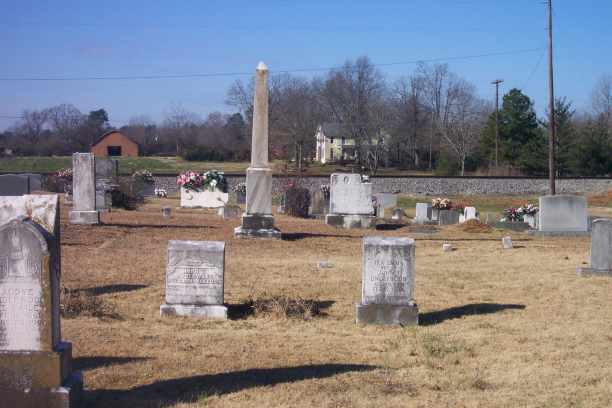
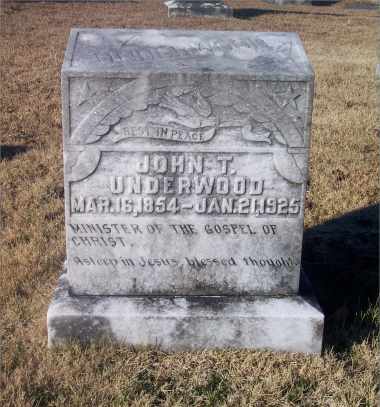
John T.
Underwood
Mar. 16, 1854 - Jan. 21, 1925
Minister Of The Gospel Of Christ
Asleep In Jesus, Blessed Thought
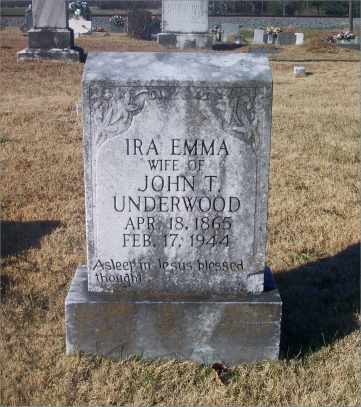
Ira Emma
Wife Of
John T.
Underwood
Apr. 18, 1865
Feb. 17, 1944
Asleep In Jesus, Blessed Thought
![]()
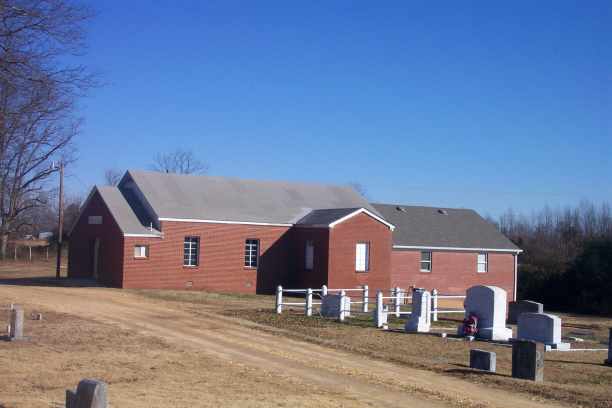
Spruce Pine Church of Christ
![]()